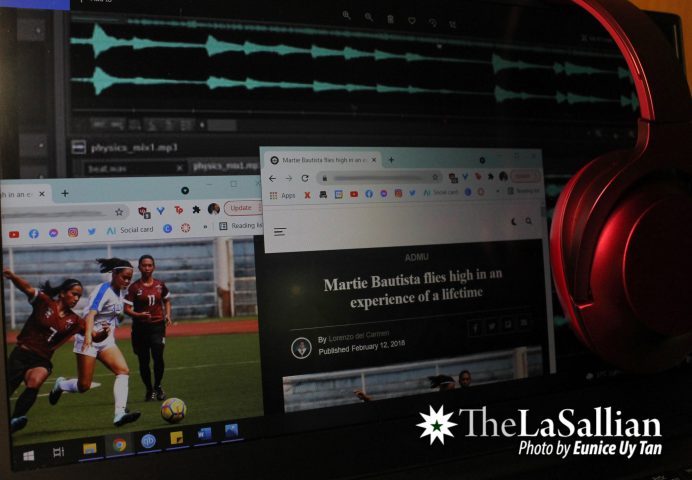Sports podcasts have been present for a long time now. The audio program acts as an engaging platform for listeners to know more about every sport, every league, and even every athlete. As it continues to develop, these podcasts stimulate the minds of avid fans by providing fresh, in-depth perspectives—whether on or off the playing field.
While podcasts impart interesting entertainment and reliable analyses, it is also keen on talking about topics that most people shy away from. From racism to gender inequality, a number of hosts use their podcasts to shed light on such outspoken issues. Especially about the struggles women face in a male-dominated field, Ceej Tantengco of “Go Hard Girls” and Martie Bautista of “So She Did” have taken the stand to provide powerful narratives about being female in the world of sports.
Bearing the torch
Inspiration plays a great deal in pursuing a passion, as it creates initial momentum for one’s purpose. Given the plethora of sports podcasts, the ability to stand out stems from the motivation to be creative and distinct in discussing topics. For Tantengco, more than the desire of beginning a podcast, it was about “giving better coverage for women in sports.” Aside from having a background in journalism, advocating for a more equal sports world for women became her main agenda upon entering podcasting. “I wanted to do women’s sports in a way that I wanted to see it covered as a sports fan and as a woman,” she expresses.
Meanwhile, Bautista seized the timely opportunity to be part of a new podcast with the intent of purely focusing on female players and personalities, which she easily relates to as a former athlete. Bautista also attributes her onset to the former, whom she highly praises for being a vivid example. “I [want to] use that platform for those specific girls who won’t be listened to,” she says.
Despite promising horizons, there is still the challenge of facing the audience, especially one that is selective in terms of the guests or themes being presented. Bautista claims, “It’s one of those frustrating things as a woman journalist, but I’d say there’s still hope in [Filipinos] just grasping the idea that there are more and even better women athletes in the country.” While difficult, the opportunity to make an impact will never be lost as the stories portrayed could act as an extra push for aspiring Filipina athletes. Additionally, having women take the helm over discussions normalizes discourses about gender equality and women empowerment in sports, which have been sidelined for a long-time already.

Breaking barriers
There has always been that common perception of women not receiving equal opportunities in the sporting industry. The industry mostly gives chances to women who have glamorous personalities or beautiful physical features. Tantengco provides advice to women going into sports, saying, “Don’t let gender stereotypes hold you back.”
Many women have qualified to compete in the upcoming Tokyo Olympics compared to men. In addition, many leagues are now being constituted for women to showcase their skills. While receiving exposure that can make young girls’ dreams turn into reality, “We can have a more equal sports industry at all levels,” Tantengco expresses.
The future of the sports industry is set to be bright for women personalities out there. Some of the leagues are now allowing women to cover games. For example, Becky Hammon, an assistant coach for the San Antonio Spurs in the NBA, was assigned to coach the team after their head coach was thrown out of the game against the Los Angeles Lakers after getting his second technical foul in the second quarter.
Talking about sports always reminds sports fans of sweaty men playing ball in a grass field or a packed stadium. Double standards, Tangtengco says, make it hard for women to join the sports industry. “That’s not because men are naturally born better than women at basketball. Women have had fewer games to play in their entire lives, whereas boys have had basketball games since they were four years old,” she stresses.
However, times have changed, and people now see women compete in high-intensity matches. Big leagues are paying more attention and investing more in women’s leagues. “We have Tottenham Hotspur, even Barcelona who just recently won their champions league for the women[‘s] [league] and you also have [the] US league and most recently the Japanese league [is] happening,” Bautista adds.
Taking the leap
The sports world is now adapting to women who are making names for themselves. Bautista shares her idea about women sharing the spotlight with men, “It’s going to be a big storm, and you have a lot of women athletes already picking and grabbing all [the] headlines compared to the men.”
With podcasting equipped to deliver sports narratives, it is only a matter of time before every athlete’s journey is heard, especially women. It is pivotal that their voices of triumph and defeat are given undivided attention. Tantengco, as part of an all-female crew, believes that being set apart from the crowd means being different with your approach in sports podcasting. She shares, “Find the stories that only you can tell. Find the discussions that only you can have with your unique perspective.”
Even with lacking equipment, success is not far-fetched as long as one is innovative and full of passion and perseverance. Maximizing podcasting as an avenue to recognize deserving yet neglected voices is one of the crucial elements to create tremendous ripple effects. As Bautista puts it, “There’s a load of sports in the country and loads of women athletes that have their own stories to share.” By listening to female podcasters, female competitors are given the chance to empower themselves and for their stories to be told.
